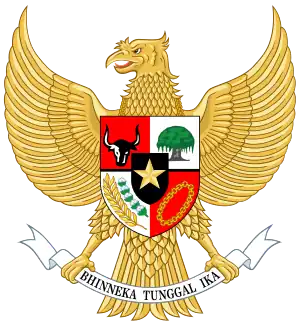The State Finance Accountability Committee (Indonesian: Badan Akuntabilitas Keuangan Negara (BAKN)) is an auditory body of the legislative branch in Indonesia's political system and was established under Paragraph 6 of Indonesian Law No.27 2009 enacted on 29 August 2009.[1]
The BAKN has the tasks of:
- a. undertaking scrutiny of the findings of audit results of the BPK which have been transmitted to the Indonesian Peoples Representative Council (DPR);
- b. transmitting the results of its scrutiny under letter a to the commissions;
- c. following up the results of commission discussions on findings of the audit results of the BPK at the request of the commissions;
- d. giving input to the BPK in the matters of the annual audit work plan, audit impediments, as well as the presentation and quality of reports (Clause 113).
- In undertaking the task under letter c, BAKN can request explanations from the BPK, the Government, regional government, other state institutions, the Bank of Indonesia, state enterprises, general service bodies, regional enterprises and other institutions and bodies which manage state finances (Clause 113[2]).
- BAKN can recommend to the commissions that BPK undertake follow up audits (Clause 113[3]).
- The results of work under a, b and d are transmitted to the DPR leadership at a plenary meeting on a periodic basis (Clause 113[4]).
- In implementing its tasks, BAKN can be assisted by accountants, experts, financial analysts and/or researchers (Clause 114).
BAKN is to prepare a draft budget for the implementation of its tasks in accordance with its needs which is then transmitted to the Household Affairs Board (Clause 115). Further requirements about the manner of BAKN's formation, composition, tasks, authority and work mechanisms are regulated by DPR regulations on order (Clause 116).
See also
References
- ↑
- Paragraph 6 of Indonesian Law No.27 2009
- The BAKN is formed by the DPR and is a permanent complementary organ of the Indonesian Peoples Representative Council (DPR) (Clause 110).
- The DPR determines the composition and membership of the BAKN at the commencement of the period of membership of the DPR and the commencement of the sessional year (Clause 111[1]).
- BAKN members number no less than 7 and no more than 9 persons, from proposals from the DPR fractions determined at a plenary meeting at the commencement of the period of membership of the DPR and the commencement of sessional year (Clause 111[2]).
- The BAKN leadership is a collective and collegial leadership entity (Clause 112[1]).
- The BAKN leadership consists of one chair and one deputy chair who are selected from and by BAKN members based on the principle of discussion to reach agreement and paying attention to the representation of women according to the balance of the number of members of each faction (Clause 112[2]).
- The selection of the BAKN leadership is undertaken in a BAKN meeting led by the DPR leadership after the determination of the composition and membership of the BAKN (Clause 112[3]).
 This article incorporates text from this source, which is in the public domain.
This article incorporates text from this source, which is in the public domain.
- Paragraph 6 of Indonesian Law No.27 2009
External links
This article is issued from Wikipedia. The text is licensed under Creative Commons - Attribution - Sharealike. Additional terms may apply for the media files.
